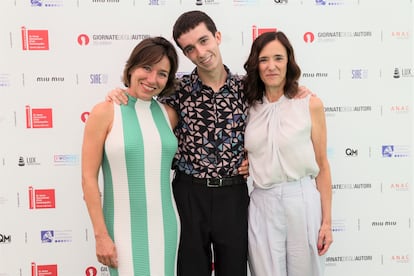At the Venice Film Festival, cinema tells the world about the history of the babies stolen during Francisco Franco’s dictatorship
‘Foremost by Night,’ Víctor Iriarte’s first feature film, wins critics over with the brave tale of two women and a child without a past. The short film ‘Aitana’, a restored version of Saura’s ‘The Hunt’ and a documentary on ‘Guernica’ round out the festival’s Spanish film offerings

Statistics are often perceived as cold. But they can also convey emotions and in the process touch hearts and consciences. Between 1940 and 1990, some 300,000 children were stolen in Spain, according to the main victims’ organizations. Director Victor Iriarte’s Foremost by Night highlights that fact at the beginning of the film. The film then narrates one such story, that of Egoz and his two mothers. It’s a dramatic and unfair tale, as all of them are. The story is fictitious, but it could have been real, much to the astonishment of a wide global audience that is likely unaware of such a catastrophe. Now, viewers can discover that history at the Venice Film Festival, where the feature film will be screened in the Giornate degli autori section.
“It is a dark chapter of our recent history, as well as a pending subject of our [collective] memory. But it is not on the [public] agenda. We wanted to give voice to it and respond to it creatively,” emphasizes the filmmaker. The director is making his feature film debut at the age of 47, although he has been working in this field for half his life: as a scheduler at Tabakalera, in San Sebastian, Spain; as a film festival worker in the same city and at the Elías Querejeta film school; as an assistant director; and as an interlocutor in talks with many other directors he knows personally. Then, after all that work, he began to ask himself: “How would I do it myself?”
He did it by telling the story through the eyes of two women, giving the film a very personal touch. Vera (Lola Dueñas) searches for answers but finds none. She knows that she could not take care of her baby when he was born. But, of course, she is also aware that she gave birth. So where is the child now? What the hell does it mean that there’s “no record”? On the other hand, Cora (Ana Torrent) was told she could not have children. So, she was given an infant and told a lie about where it came from: the baby was motherless, the mother had died in childbirth. Egoz was left without a past but with what Iriarte describes as “cosmic loneliness.”
A few decades ago, such events happened thousands of times in Spain. That is what the mothers and children who experienced it firsthand told the director. “It was more emotional research than journalistic investigation. Most shared a feeling of helplessness and abandonment by those who should protect them in a democratic state,” says Iriarte. In the film Vera describes it as “being in two places at once, without the ability to rest.”
The film itself moves between several places. It’s told in four sections, each with different genres, from noir to melodrama, in pursuit of the best visuals for each moment; the movie is courageously told and full of ideas. The film is unafraid of taking risks, trying new things, surprising, even failing, if necessary. Two heavyweights of Spanish cinema—Isaki Lacuesta and Isa Campo—helped in the film’s production. “I can no longer be a young promising [filmmaker], I don’t want to prove anything. It wasn’t a question of ‘let’s see how to tell this in a weird way.’ It came naturally to me. I understand filmmaking as freedom to experiment, not so much in the abstract, but with [certain] aspects of the story. I don’t put the subject matter first: the story is important, and so is the form,” Iriarte reflects. The performances, the soundtrack, the direction and the aesthetics: Foremost by Night represents a stupendous blend of elements that move you or make you uncomfortable. The film’s only flaw is overemphasizing its intelligence or indignation at certain points.

In any case, once again Spanish cinema is going to Venice to denounce the country’s darkest moments. Two years ago, Pedro Almodovar’s Parallel Mothers opened the event, showing wounds that still bleed from mass graves and the nameless dead. In 2022, Juan Diego Botto shined a spotlight on the margins and the evictions that take place there every day. And now Foremost by Night addresses Spain’s stolen babies. “It’s an issue that gets swept under the rug. Every four or five months, a case appears in the press as an isolated story, and it’s always sad, [it’s] a trauma and [there’s] a woman who goes after the system directly. But it is not confronted as a general issue related to the economy, ideology...,” Iriarte explains. He goes on to enumerate the many issues: bills that do not become laws, complaints that remain isolated, the request for a National DNA Bank, the documents requested by the victims that never appear.
Perhaps the film’s cri de coeur will be heard in Venice and, after that, elsewhere. But Spanish cinema almost never enters the official section, except for Almodóvar’s movies and the cinema of J. A. Bayona, who will close this year’s Mostra with The Society of Snow, a film reconstruction of the 1972 plane crash in the Andes. But virtually every year Spain’s films occupy parallel sections at the festival. Rodrigo Sorogoyen, Oskar Alegría, Raúl Arévalo, Juanjo Giménez, the aforementioned Botto... and, this year, three other projects. All told, they offer an authentic thesis about memory: the one being lost by Aitana, María Teresa Leon and Rafael Alberti’s daughter, and filmed by her daughter Marina Alberti, in the short film of the same name; Carlos Saura’s movie, honored with a restored version of The Hunt; and the one associated with the documentary Frente a Guernica [Facing Guernica], which the Reina Sofía Museum commissioned to Yervant Gianikian and Angela Ricci Lucchi; the film shows the complete footage after going through the art gallery.
“It’s very naïve to think that films belong only to the directors. Today they exist long before they are finished, they have sales agents who have several meetings to promote them. And, in this sense, a festival like this is a great showcase,” Iriarte observes. When Foremost by Night premieres, the filmmaker believes that being the “Spanish film that was in Venice” may help it. When they leave the theater, however, the audience will have another memory: that of a stolen life. One of 300,000.
Sign up for our weekly newsletter to get more English-language news coverage from EL PAÍS USA Edition
Tu suscripción se está usando en otro dispositivo
¿Quieres añadir otro usuario a tu suscripción?
Si continúas leyendo en este dispositivo, no se podrá leer en el otro.
FlechaTu suscripción se está usando en otro dispositivo y solo puedes acceder a EL PAÍS desde un dispositivo a la vez.
Si quieres compartir tu cuenta, cambia tu suscripción a la modalidad Premium, así podrás añadir otro usuario. Cada uno accederá con su propia cuenta de email, lo que os permitirá personalizar vuestra experiencia en EL PAÍS.
¿Tienes una suscripción de empresa? Accede aquí para contratar más cuentas.
En el caso de no saber quién está usando tu cuenta, te recomendamos cambiar tu contraseña aquí.
Si decides continuar compartiendo tu cuenta, este mensaje se mostrará en tu dispositivo y en el de la otra persona que está usando tu cuenta de forma indefinida, afectando a tu experiencia de lectura. Puedes consultar aquí los términos y condiciones de la suscripción digital.









































